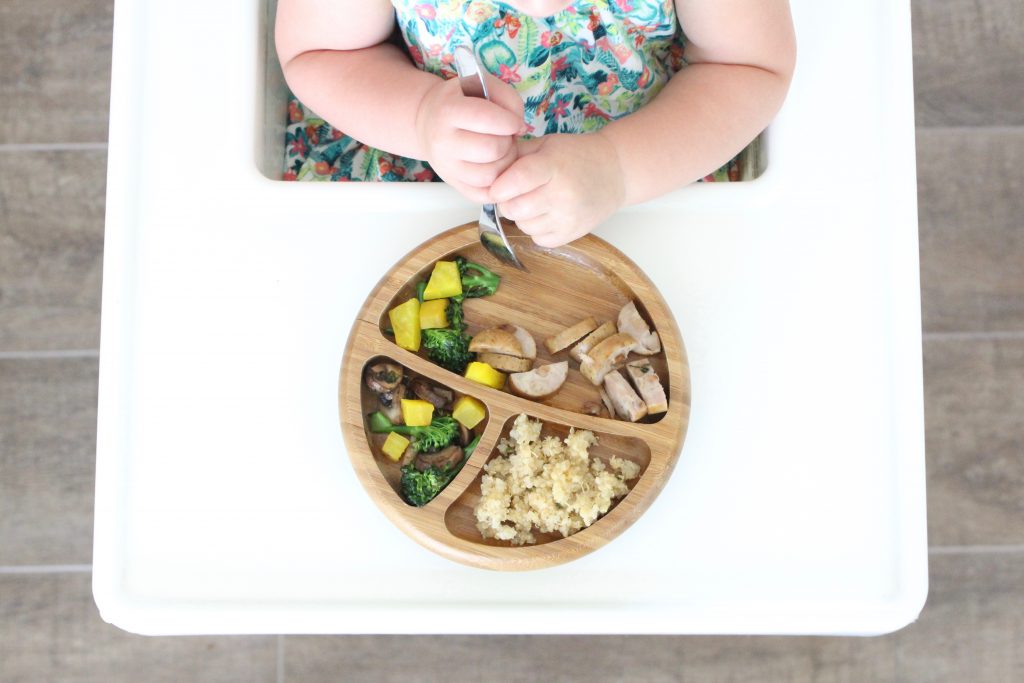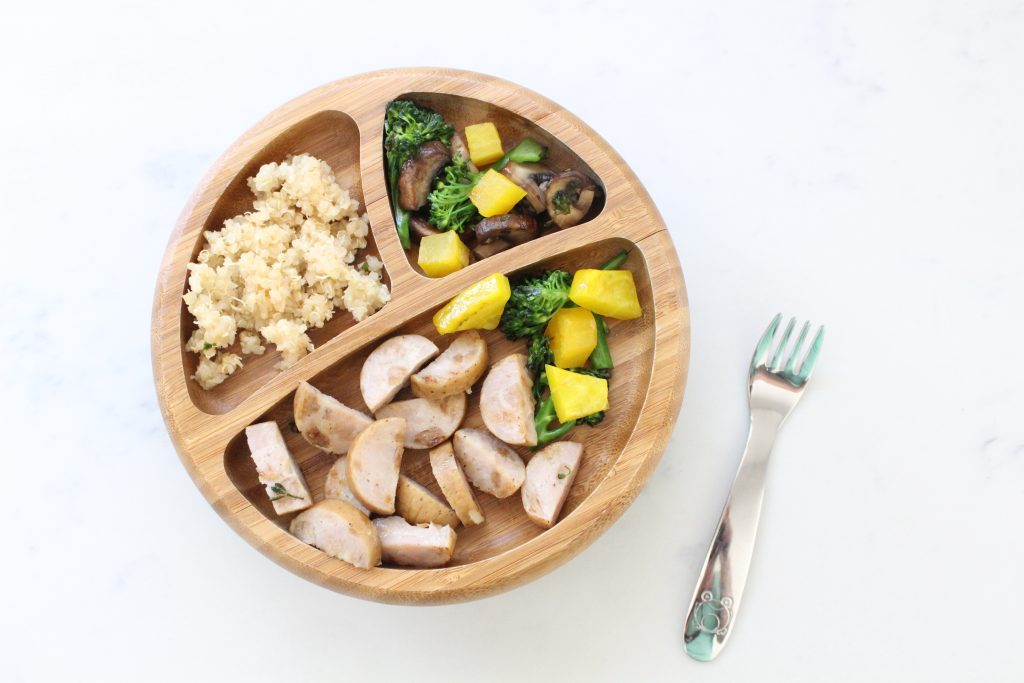 I post “what Elle’s eating” on Instagram stories all the time and I have so many mamas ask me how I get her to eat all that nutritious food. A great question and one I think countless parents are asking these days.
I post “what Elle’s eating” on Instagram stories all the time and I have so many mamas ask me how I get her to eat all that nutritious food. A great question and one I think countless parents are asking these days.
Since we have so many newly developed “kid” and “baby” foods on the market, parents are really struggling to figure out why their kids don’t want to touch veggies and beg for the baby puffs, sugary cereals and mac and cheese.
Sure, I’m a Dietitian Nutritionist so it’s really no option for my kiddo to go any other way than healthy, but the more I learn, the more I realize how simple the whole “feeding littles” thing is.
Actually, it’s a really similar conversation as this whole “feeding adults” controversy we’ve been up against for years. I am constantly telling my clients, “Just eat real, whole foods. If it's processed- comes in a box, can, package...it probably isn't the best option.”
It’s pretty simple when we take a step back from calories and diet this and diet that and get back to the root of the issue. Processed food is making us fat, sick and quite unhappy.
So I preach real food. To just about anyone who will listen. Sustainably raised meat, poultry and wild fish, organic veggies and fruits, nuts and seeds, butter, avocado and the like.
And you know what mama, feeding our little humans is no different.

They, of all age groups, need nourishment from real, whole foods like no one else. Their bodies are rapidly growing, changing, developing, learning, moving, etc. They need whole forms of protein, fat, carbohydrates, vitamins, minerals, and water so they not only grow properly, but thrive.
I know you get it, you’re no dummy, but that doesn’t mean you don’t struggle to nourish your little. Because I see this struggle with just about every parent, I’ve put together my top 3 tips to get baby started off right because I believe that the best way to grow up a good eater is by starting them on real food from day one. This is going to set you up on the easiest road, though not perfect by any means, and avoid so many of the terrible table moments.
Wherever you are in feeding your little, I hope this helps. Don't give up. Think of healthy food as medicine and get it in your babies and littles.
If you're reading this and you're littles aren't so little anymore and you already have a picky eater, I've got a post coming soon just for you!

Top 3 Tips to Start Baby Off Right
Start with real food. Right off the bat.
Some of the best “first foods” for baby are organic avocado, frozen grated liver, soft boiled egg yolks, soup stock, vegetables braised in stock/broth and stewed, pureed fruits (always with a little healthy fat like ghee or coconut oil). Not rice cereal. If you start them off with a variety of whole foods, you’re setting their palate (and bodies, of course) on the right path and keeping your chances of bringing up a picky eater at a minimum.
Avoid puffs, cereals and processed grain-based foods.
Babies are “functionally grain intolerant” as Dr. Katherine Erlich, MD puts it in my favorite book on feeding littles titled, “Super Nutrition for Babies.” Babies don’t begin making the enzymes to break down grains until around one year of age and aren’t fully enzyme equipped until around age 3. For this reason, I highly recommend avoiding processed grains all together and when baby hits one, offering properly prepared grain dishes like soaked oatmeal or sourdough bread. Both with plenty of grass-fed butter, of course.
For babies and littles, focus on getting "slow", nutrient dense carbohydrates from veggies, some fruit and properly prepared grains. In the first handful of months of feeding, I did all cooked veggies and fruits with a little fat added to ensure baby girl could digest the food well and use the nutrients best (fats help with the assimilation of super important fat-soluble vitamins like vitamins A and D...see below!).
Focus on the fats.
Babies need plenty of fat and cholesterol for their rapidly developing little bodies and brains and I fear this is a nutrient many babies are missing in their diets today. Saturated fats from organic, sustainably raised animals and animal fats help with nutrient absorption from foods, proper brain development, lung and heart tissue health, provide antimicrobial powers in the gut and so much more. Cholesterol, found in these same types of foods, is a healing agent and is necessary to protect cellular, nervous system a brain function and critical for digestive health and intestinal wall integrity (no thank you leaky gut!), among other things.
Ensure baby is getting plenty of healthy fats by serving fruits and vegetables with ghee, butter or coconut oil and offering plenty of healthy sources of animal proteins and fats.
Keep in mind that as your little one’s nutrient needs shift, taste buds change, and their will to be the boss stretches, you’ll need to practice patience mama. Remember that every meal is an opportunity to nourish, but sometimes life happens. Give yourself grace and take steps forward day by day. You got this!
Source List:
The Nourishing Traditions Book of Baby and Childcare







